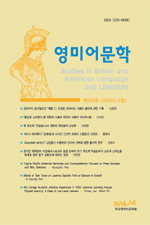- 영문명
- The Alchemical Imagination in Ben Jonson’s The Alchemist
- 발행기관
- 한국영미어문학회
- 저자명
- 간행물 정보
- 『영미어문학』영미어문학 제145호, 41~60쪽, 전체 20쪽
- 주제분류
- 어문학 > 영어와문학
- 파일형태
- 발행일자
- 2022.06.30

국문 초록
영문 초록
This paper explores the alchemical imagination in Ben Jonson’s The Alchemist . In the Renaissance, alchemy was a kind of natural philosophy that contributed to the development of modern science. As The Alchemist was a product of widespread alchemical knowledge in Renaissance England, there are multiple symbolic representations of alchemy in the play. Subtle and Face define each other as a homunculus that is created by Paracelsus and looks like a human being but much smaller. Paracelsus, an alchemist and physician in the Renaissance, mentions that a homunculus is created by art (i.e. alchemy), putting the semen of a man in a cucurbit to putrefy along with horse dung for forty days. Thus, the play implies that Face and Subtle can be homunculi created in the great cucurbit, London, corrupted both morally and physically. The behaviour of characters filled with desire accelerates corruption in London, which is important for regeneration in the play as Paracelsus describes corruption as the first step and an essential process for regeneration. In the meantime, the dramatis personae experience the process of transmutation in Lovewit’s mansion, which is not only an imaginary space but also a space of transmutation. Therefore, Lovewit’s mansion becomes both a theatre and laboratory in which the characters attempt to transform their identities. With regard to this, John Shanahan argues that The Alchemist represents two cultures between arts and sciences. Therefore, the play seems to represent the influence that alchemy has on society and, as Justin Kolb explains, is a product of alchemical practices and thought in Renaissance England.
목차
키워드
해당간행물 수록 논문
참고문헌
최근 이용한 논문
교보eBook 첫 방문을 환영 합니다!

신규가입 혜택 지급이 완료 되었습니다.
바로 사용 가능한 교보e캐시 1,000원 (유효기간 7일)
지금 바로 교보eBook의 다양한 콘텐츠를 이용해 보세요!


